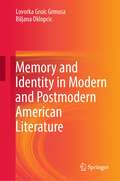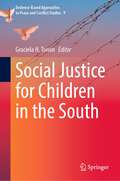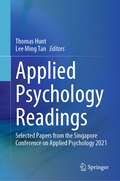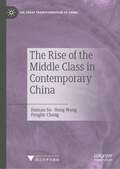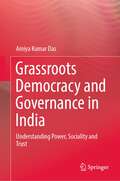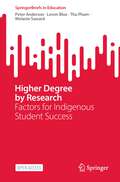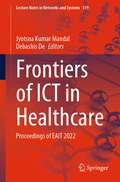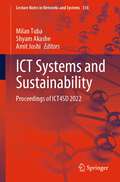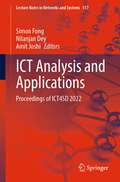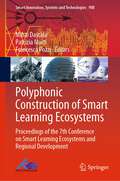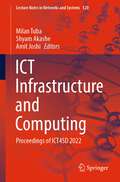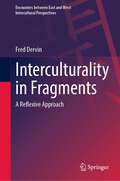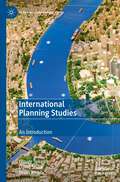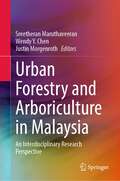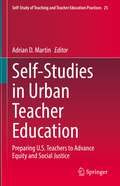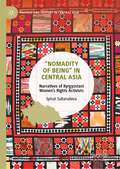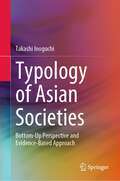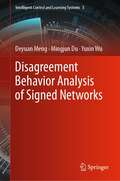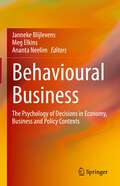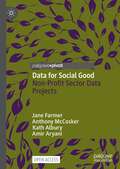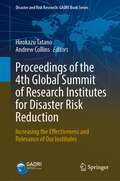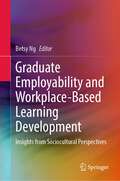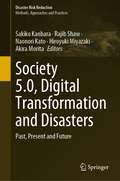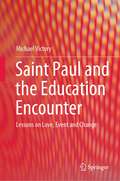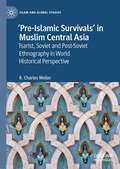- Table View
- List View
Memory and Identity in Modern and Postmodern American Literature
by Lovorka Gruic Grmusa Biljana OklopcicThis book discusses how American literary modernism and postmodernism interconnect memory and identity and if, and how, the intertwining of memory and identity has been related to the dominant socio-cultural trends in the United States or the specific historical contexts in the world. The book’s opening chapter is the interrogation of the narrator’s memories of Jay Gatsby and his life in F. Scott Fitzgerald’s The Great Gatsby. The second chapter shows how in William Faulkner’s Light in August memory impacts the search for identities in the storylines of the characters. The third chapter discusses the correlation between memory, self, and culture in Tennessee Williams’s A Streetcar Named Desire. Discussing Robert Coover’s Gerald’s Party, the fourth chapter reveals that memory and identity are contextualized and that cognitive processes, including memory, are grounded in the body’s interaction with the environment, featuring dehumanized characters, whose identities appear as role-plays. The subsequent chapter is the analysis of how Jonathan Safran Foer’s Everything Is Illuminated deals with the heritage of Holocaust memories and postmemories. The last chapter focuses on Thomas Pynchon’s Against the Day, the reconstructive nature of memory, and the politics and production of identity in Southeastern Europe.
Social Justice for Children in the South (Evidence-Based Approaches to Peace and Conflict Studies #9)
by Graciela H. TononThis book considers that contextual factors are important for the achievement of social justice and it recognizes that vulnerability to which children are exposed is a phenomenon throughout the planet, particularly in the South. It presents a theoretical review of social justice as well as different situations of vulnerability children experience in their daily lives in which they can be injured, affecting their well-being and the exercise of their rights. It examines the impact of the COVID-19 pandemic on children, considered as a vulnerable group warranting special social policy considerations. It also presents the need to change power structures in knowledge production and decision-making processes to achieve social justice for children; the importance of investing in children; the exclusion of children from participation in certain activities and the shame of not being able to participate in equal conditions with others; the lives of migrant children belonging to ethnic minorities exposed to language barriers and access to technological devices; and the analysis of the process of social re-integration of children from conditions of armed conflict. The book concludes that governments need to assume social justice as part of universal human interests, providing security, conditions for well-being, and guaranteeing social justice for all children.
Applied Psychology Readings: Selected Papers from the Singapore Conference on Applied Psychology 2021
by Thomas Hunt Lee Ming TanThis book is a compilation of the best papers presented at the 2021 edition of the Singapore Conference of Applied Psychology (SCAP) organised and facilitated by East Asia Research in Singapore. The selection of papers addresses the latest innovations, trends, concerns and practical challenges encountered in the field, and poses practical solutions within the field of applied psychology. The theme for 2021 is psychological well-being, and so the collection covers aspects of clinical and non-clinical psychological well-being in different arenas, from education to the workplace. Following a rigorous peer-review process led by the School of Psychology at the University of Derby, this collection is a valuable resource for academics, researchers and practitioners looking to keep themselves up-to-date with recent research in the field. The book is of interest to educators and practitioners in applied psychology focused on well-being.
The Rise of the Middle Class in Contemporary China (The Great Transformation of China)
by Hainan Su Hong Wang Fenglin ChangThis book portrays the middle class in contemporary China with plain language and precise professional knowledge in an all-round, broad and responsible way from the perspectives of income, property, profession, education, consumption, investment, physiological and behavioral characteristics, history and development. It gives, in a logical order, the reasons for stimulating the rise of the middle class in contemporary China. It emphatically describes what the middle class is and what the middle class in contemporary China looks like. It also analyzes whether the middle class can rise in China and sheds light on the basic thinking, medium and long-term goals, main measures and current work priorities for achieving full rise of the middle class in contemporary China. As China becomes the world's largest economy, the new middle class will be the Chinese people facing the world; as such, this book will be of interest to sociologists, sinologists, political scientists, and economists.
Grassroots Democracy and Governance in India: Understanding Power, Sociality and Trust
by Amiya Kumar DasThis book approaches grassroots governance and democracy from a sociological perspective, focusing on the interaction between the community and the State. It explores the interrelationship between state, governance and community and demonstrates the performativity aspects of both political actors and citizens in various elections in India. It also highlights the need to understand the dynamics of governance in a multi-ethnic society and democracy like India both at the micro and macro levels. Offering detailed explanations of formal and informal governance in people’s everyday lives, it reviews some of the key debates on governance with respect to the engagement of the community. This book is intended for academics, researchers, activists, planners and policymakers from a range of disciplines, such as sociology, public policy, social anthropology, development studies, politics and regional development, interested in governance and development in India.
Higher Degree by Research: Factors for Indigenous Student Success (SpringerBriefs in Education)
by Peter Anderson Levon Blue Thu Pham Melanie SawardThis open access book provides insights from Indigenous higher degree research (HDR) students on supervision practices in an Australian context. It examines findings from qualitative studies conducted with Indigenous HDR students from different academic disciplines, enrolled higher education institutions across Australia, and supervisors of Indigenous HDR students. Six types of data and their thematic analyses are presented, to understand the needs and experiences of both Indigenous HDR students and supervisors of Indigenous HDR students. This book also unpacks assumptions and commonly held beliefs about Indigenous HDR students, and shares what Indigenous HDRs report they need to experience success in higher education. It reports the experiences of supervisors of Indigenous HDR students, and explore further opportunities which enhance the higher education experiences of Indigenous HDR students. This book also suggests how successful relationships between Indigenous HDR students, and their supervisors may be fostered, and aims to be a useful resource for Indigenous peoples wishing to pursue higher education, and HDR supervisors in countries with Indigenous populations.
Frontiers of ICT in Healthcare: Proceedings of EAIT 2022 (Lecture Notes in Networks and Systems #519)
by Jyotsna Kumar Mandal Debashis DeThe book includes original unpublished contributions presented at the Seventh International Conference on Emerging Applications of Information Technology (EAIT 2022), organized by Computer Society of India, Kolkata, Chapter during March 30–31, 2022. The book covers the topics such as image processing for smart healthcare applications, computer vision and pattern recognition for health care, Internet of Health Things, 5G and beyond in smart health care for sustainable cities.
ICT Systems and Sustainability: Proceedings of ICT4SD 2022 (Lecture Notes in Networks and Systems #516)
by Milan Tuba Shyam Akashe Amit JoshiThis book proposes new technologies and discusses future solutions for ICT design infrastructures, as reflected in high-quality papers presented at the 7th International Conference on ICT for Sustainable Development (ICT4SD 2022), held in Goa, India, on 29–30 July 2022. The book covers the topics such as big data and data mining, data fusion, IoT programming toolkits and frameworks, green communication systems and network, use of ICT in smart cities, sensor networks and embedded system, network and information security, wireless and optical networks, security, trust, and privacy, routing and control protocols, cognitive radio and networks, and natural language processing. Bringing together experts from different countries, the book explores a range of central issues from an international perspective.
ICT Analysis and Applications: Proceedings of ICT4SD 2022 (Lecture Notes in Networks and Systems #517)
by Simon Fong Nilanjan Dey Amit JoshiThis book proposes new technologies and discusses future solutions for ICT design infrastructures, as reflected in high-quality papers presented at the 7th International Conference on ICT for Sustainable Development (ICT4SD 2022), held in Goa, India, on July 29–30, 2022. The book covers the topics such as big data and data mining, data fusion, IoT programming toolkits and frameworks, green communication systems and network, use of ICT in smart cities, sensor networks and embedded system, network and information security, wireless and optical networks, security, trust, and privacy, routing and control protocols, cognitive radio and networks, and natural language processing. Bringing together experts from different countries, the book explores a range of central issues from an international perspective.
Polyphonic Construction of Smart Learning Ecosystems: Proceedings of the 7th Conference on Smart Learning Ecosystems and Regional Development (Smart Innovation, Systems and Technologies #908)
by Mihai Dascalu Patrizia Marti Francesca PozziThe book brings together the contributions of the 7th International Conference on Smart Learning Ecosystems and Regional Development (SLERD 2022), which aims at promoting reflection and discussion concerning R&D work, policies, case studies, and entrepreneur experiences with a special focus on understanding the relevance of smart learning ecosystems (e.g., schools, campus, working places, informal learning contexts, etc.) for regional development and social innovation and how the effectiveness of the relation of citizens and smart ecosystems can be boosted. This forum has a special interest in understanding how technology mediated instruments can foster the citizen’s engagement with learning ecosystems and territories, namely by understanding innovative human-centric design and development models/techniques, education/training practices, informal social learning, innovative citizen-driven policies, technology mediated experiences, and their impact. This set of concerns will contribute to foster the social innovation sectors and ICT and economic development and deployment strategies alongside new policies for smarter proactive citizens.
ICT Infrastructure and Computing: Proceedings of ICT4SD 2022 (Lecture Notes in Networks and Systems #520)
by Milan Tuba Shyam Akashe Amit JoshiThis book proposes new technologies and discusses future solutions for ICT design infrastructures, as reflected in high-quality papers presented at the 7th International Conference on ICT for Sustainable Development (ICT4SD 2022), held in Goa, India, on 29–30 July 2022. The book covers the topics such as big data and data mining, data fusion, IoT programming toolkits and frameworks, green communication systems and network, use of ICT in smart cities, sensor networks and embedded system, network and information security, wireless and optical networks, security, trust, and privacy, routing and control protocols, cognitive radio and networks, and natural language processing. Bringing together experts from different countries, the book explores a range of central issues from an international perspective.
Interculturality in Fragments: A Reflexive Approach (Encounters between East and West)
by Fred DervinThis book continues the author’s long-term reflections (over 20 years of scholarship and experience in intercultural communication education) around the fascinating and yet contestable notion of interculturality in education. As an unstable and polysemic notion, interculturality deserves to be opened up again and again and there is a need to engage with it continuously, observing, critiquing and problematizing its complexities. This book urges researchers, students and interculturalists to take the time to think carefully and deeply about interculturality and to find inspiration beyond the dominating ‘Western’ ideological world of intercultural research and education. This book starts from short fragments written by the author for himself over a period of one year. In these short statements and notes about interculturality, the author reflects creatively on the questions he had in mind at the time of writing and offers some (temporary) answers, which, in turn, are questioned and revised. Over the 1000 fragments that the author wrote, he selected about 100, for which he wrote commentaries, referring to and reviewing current research and debates on interculturality in the process. One of the specificities of the book is to be highly multidisciplinary to help us get used to looking for inspiration in other fields of research and creativity. The fragments can be read randomly – the reader may open the book at any page and pick any fragment. The author suggests reading each individual fragment first and then the accompanying explanatory texts. While reading them, the reader is also invited to reflect on any potential addition to what the author wrote – anything they might dis-/agree with, anything they would have wanted to discuss with the author. Questions have been added at the end of each chapter for readers to reflect on and to enrich their own criticality and reflexivity. The book serves as continuous guidance for engaging with interculturality.
International Planning Studies: An Introduction (Planning, Environment, Cities)
by Olivier Sykes David Shaw Brian WebbThis book provides a comprehensive introduction to the evolving field of international planning studies. It is an essential resource that situates planning as an international discipline and practice with an important role to play in delivering sustainable development across different scales in diverse global contexts. A series of chapters covers past episodes of international influence and exchange in planning, key concepts, research strategies, methods in contemporary international planning studies, as well as ways of characterising and comparing planning systems. The authors explore the emergence of a global agenda for planning, through the activities and goal setting of international organisations, and professional and civil society networks. Transnational and cross-border contexts and initiatives in different global regions, and their relevance to planning, are investigated. An invaluable resource for students and researchers in planning studies, this book offers an important reflection on the internationalisation of planning practice, education, and scholarship, and the future prospects for planning and planning studies from an international perspective.
Urban Forestry and Arboriculture in Malaysia: An Interdisciplinary Research Perspective
by Sreetheran Maruthaveeran Wendy Y. Chen Justin MorgenrothThis book represents the latest research on urban forestry in a Malaysian context. It demonstrates that urban forestry is concerned not only with environmental enhancement, but also other aspects, such as recreation, health and well-being, and government policies. This edited collection provides a comprehensive overview of urban forestry studies from various researchers in Malaysia, and includes rich historical perspectives of urban forestry in the country. It also tackles related issues in policy. The greening of urban Malaysia in the 1970s focused primarily on beautification and was primarily the province of horticulturists, landscapers, nursery workers, town planners, and architects, with negligible inputs from foresters, particularly urban foresters. Perhaps for that reason, the term “landscaping” has been used more widely than “urban forestry” by government and private institutions, politicians, stakeholders, academicians, and the public. Nevertheless, the authors show that the concept of urban forestry is not new for developing countries such as Malaysia, where urbanization is increasing at a rapid rate. The book unpacks this demographic shift from a predominantly rural to a principally urban society. As the only unified body of work on urban forestry and arboricultural studies in Malaysia, this volume presents an important interdisciplinary reference for students, researchers, and scholars in physical geography, forestry and urban forestry, arboriculture and landscape architecture, both in Malaysia, and in other developing urbanizing countries, particularly in Southeast Asia. It is also an important resource for those working in environmental policy and practice, excavating the vital connection between the environment and well-being.
Self-Studies in Urban Teacher Education: Preparing U.S. Teachers to Advance Equity and Social Justice (Self-Study of Teaching and Teacher Education Practices #25)
by Adrian D. MartinThis book critically explores pedagogical activities, policies, and coursework that teacher education programs can provide to more fully prepare teacher candidates and in-service educators for professional practice in urban schools. It illustrates how teacher educators from across the United States are supporting teacher candidates and in-service teachers to possess the knowledge, skills, and dispositions for equity-oriented instructional practices and advocacy for professional engagement in the urban context. Chapters share insider perspectives of urban teacher education on preparing teachers to teach in culturally, linguistically, and socio-economically diverse classrooms. They discuss teacher educators’ learning about their own practice in the preparation of teachers for city schools, preparing teacher candidates from rural and suburban contexts to teach in urban settings, and supervising practicing teachers in city classrooms. The volume also focuses on the interplay of cultural and linguistic parity between teacher educators and their preservice/in-service teacher students, implementing learning activities or coursework about teaching in urban schools, and enacting critical pedagogical practices. This book will be beneficial to teacher educators focused on teacher preparation for city classrooms and urban school districts, and researchers seeking to adopt self-study methodology in their own research endeavors.
”Nomadity of Being” in Central Asia: Narratives of Kyrgyzstani Women’s Rights Activists (Politics and History in Central Asia)
by Syinat SultanalievaThis book offers a new framework for understanding feminism and political activiism in Kyrgyzstan, “nomadity of being. ” Here, foreign information and requirements, even forced ones, are transformed into an amalgamation of the new and the old, alien and native—like kurak, a quilted patchwork blanket, made from scraps. Conceptualizing feminist narratives in Kyrgyzstan, while keeping in mind, the complex relationship between ideological borrowing, actualization, appropriation or self-colonization of “feminist” concepts can expand both scholarly and activist understanding of specificities of post-Soviet feminisms from a historiographic point of view. Kurak-feminism is feminism that is half-donor-commissioned, half-learned through interactions (personal, media, academic, professional), unashamed of its borrowed nature and working toward its own purpose that is being developed as the blanket is being quilted. Weaving in elements from completely different and, to a Western eye, incompatible approaches nomadity of being might pave the way toward a Central Asian reframing of non-Western feminisms. This provocative text will interest scholars of European politics, the post-Soviet sphere, and feminists.
Typology of Asian Societies: Bottom-Up Perspective and Evidence-Based Approach
by Takashi InoguchiThis book is about generating types of societies by the degree of individuals’ satisfaction with life domains, aspects, and styles via factor analysis. It adopts an evidence-based approach in typologizing and a bottom-up rather than a top-down perspective. Thus, the book’s position is against Hegel (freedom for one person), Marx (the Asiatic mode of production), Weber (Protestant ethics and the spirit of capitalism), Wittfogel (Asiatic autocracy), and Rostow (Western-led modernization). These classical and modern authors tend to see Asian societies with somewhat fixated eyes and categorize Asian societies in a top-down manner.When random-sampled respondents are questioned about their satisfaction with daily life in terms of life domains, aspects, and styles, public policy and institutions as well as survival and social relations are inevitably touched upon—the latter two being the key dimensions common to the World Values Survey and other cultural surveys. This book proposes a new mode of typologizing societies, Asian or non-Asian, not immediately familiar to human geographers, cultural anthropologists, or sociologists, but revealing many complex unknowns with the easy-to-learn typologizing method.
Disagreement Behavior Analysis of Signed Networks (Intelligent Control and Learning Systems #5)
by Deyuan Meng Mingjun Du Yuxin WuThis book investigates the disagreement behavior analysis problems for signed networks in the presence of both cooperative and antagonistic interactions among agents. Owing to the existing antagonistic interactions, signed networks exhibit a variety of disagreement behaviors subject to different topology conditions, especially in comparison with commonly considered unsigned networks involving only cooperative interactions among agents. Since signed networks are generally adopted to describe the dynamics of some practical network systems, they have attracted much attention in many areas, such as biology, sociology, economics, and politics. By focusing on agents with the first-order linear dynamics, the book establishes the systematic behavior analysis frameworks for signed networks, under which diverse disagreement behaviors have been disclosed, including both convergence and fluctuation behaviors, regardless of static or dynamic network topologies. In particular, a class of dynamic signed networks has been introduced, together with the associated dynamic distributed controller design and disagreement behavior analysis of agents. This book is intended for undergraduate and graduate students, engineers, and researchers who are interested in control of network systems, multi-agent systems, social networks, and so on.
Behavioural Business: The Psychology of Decisions in Economy, Business and Policy Contexts
by Janneke Blijlevens Meg Elkins Ananta NeelimThis book explores all aspects of the new and emerging area of behavioural business. This book identifies behavioural business as a powerful application of the latest insights and tools from psychology and behavioural science to decision-making in business, management and policy. This book uniquely positions behavioural business as different from both behavioural economics and psychology. This book instead applies a fresh focus on behavioural interventions in policy and business. This book introduces this new area and showcases what it contributes to a number of important contemporary business and policy issues. These include behavioural insights for managers in diverse and multi-cultural workplaces, designers of organisations, interventions, products and services, financial advisors, public policy makers, business creatives and entrepreneurs as well as charity and NGO practitioners. This book summarises state-of-the-art knowledge in the areas of expertise of the authors, who are members of the Behavioural Business Lab at RMIT University in Australia. This book will interest advanced students in related subjects as well as academics and policy makers hoping to learn and apply behavioural insights to their areas of expertise.
Data for Social Good: Non-Profit Sector Data Projects
by Jane Farmer Anthony McCosker Kath Albury Amir AryaniThis open access book provides practical guidance for non-profits and community sector organisations about how to get started with data analytics projects using their own organisations’ datasets and open public data. The book shares best practices on collaborative social data projects and methodology. For researchers, the work offers a playbook for partnering with community organisations in data projects for public good and gives worked examples of projects of various sizes and complexity.
Proceedings of the 4th Global Summit of Research Institutes for Disaster Risk Reduction: Increasing the Effectiveness and Relevance of Our Institutes (Disaster and Risk Research: GADRI Book Series)
by Hirokazu Tatano Andrew CollinsThis book presents selected papers by the keynote speakers and other presenters from various disciplines and includes their opinions and evaluations. The Fourth Global Summit of Research Institutes for Disaster Risk Reduction (4th GSRIDRR, 2019): Increasing the Effectiveness and Relevance of our Institutes, sponsored by the Global Alliance of Disaster Research Institutes (GADRI) and Kyoto University, was hosted by and held at the Disaster Prevention Research Institute (DPRI), Kyoto University, Uji Campus, Kyoto, Japan, 13–15 March 2019..The Global Summit series provided a platform for researchers, practitioners, policy makers, and other stakeholders in both government and non-governmental institutes involved in disaster risk reduction and resilience to come together to discuss, share, and exchange ideas. It focuses specifically on contributing input to the contextualization and revision of the goals of the 2016 Science and Technology Roadmap to implementation of the Priority Areas of the Sendai Framework for Disaster Risk Reduction Agenda 2015–2030, with input for GADRI to move forward in its contributions to the worldwide science community. The conference comprised an impressive array of global stakeholders whose expertise and experience encompassed the management of knowledge and its application for governments and industries, with shared outcomes to bridge science and decision making. It enhanced a process to confront new scientific challenges in disaster risk reduction and disaster risk management.The conference accomplished the following major goals, among others: (1) engagement in dialogue on issues related to disaster prevention and contributions to the Science and Technology Roadmap adopted to support the implementation of the Sendai Framework Agenda 2015–2030; (2) evaluation of current efforts on global and national involvement in the field of disaster prevention research in relation to the implementation of the Priority Areas of the Sendai Framework for Disaster Risk Reduction 2015–2030; (3) assessment of the status of current research knowledge and efforts, and research results at the institutional level in each country.
Graduate Employability and Workplace-Based Learning Development: Insights from Sociocultural Perspectives
by Betsy NgThis book presents a comprehensive discussion of sociocultural perspectives on graduate employability and workplace-based learning development. It draws on Vygotsky’s theories such as situated learning and sociocultural perspectives, as well as the constructivist learning theory. This book showcases theoretical and empirical analyses that show how institutions, decision-makers or academics can work together to enhance job employability in this age of uncertainty. It discusses issues such as the development of emerging and employability skills, examines research in higher education and workplace-based learning development, and proposes directions for the changing nature in real-world settings. This book details empirical research in the field using quantitative, qualitative and mixed method approaches, and summarizes the key conclusions pertaining to graduate employability skills as well as workplace learning culture and technology-mediated environment. It includes contributions from experienced international scholars, and offers detailed insights for readers who want a timely understanding of research trends in graduate employability and workplace-based learning development.
Society 5.0, Digital Transformation and Disasters: Past, Present and Future (Disaster Risk Reduction)
by Sakiko Kanbara Rajib Shaw Naonori Kato Hiroyuki Miyazaki Akira MoritaThis book presents the evolution of the science technology paradigm in Japan and analyzes the critical community and local governance issues from the perspectives of the changing risk landscape, Society 5.0, and digital transformation. It also provides suggestions for the future development of a resilient society and community, by drawing lessons from other countries.Advancements in science technology in recent decades in Japan and the world might have increased our capacity to tackle the adverse human consequences of various kinds of disasters and environmental issues. However, the accompanied and interlinking phenomena of urbanization, climate change, rural to urban migration, population decreases, and aged population have posed new challenges, especially in the small, medium-sized cities, and in rural areas of Japan. This is also enhanced by the risk of cascading, complex and systemic risk, which is defining a new normal as “living with uncertainties”.Society 5.0 is defined as "A human-centered society that balances economic advancement with the resolution of social problems by a system that highly integrates cyberspace and physical space." Society 5.0 was proposed in the 5th Science and Technology Basic Plan as a future society that Japan should aspire to. Society 5.0 achieves a high degree of convergence between cyberspace (virtual space) and physical space (real space), compared with the past information society (Society 4.0) that people would access a cloud service (databases) in cyberspace via the Internet and search for, retrieve, and analyze information or data.In Japan, in the initial stage, a great deal of confusion about the number of people infected with coronavirus occurred. Not only made it inefficient, but it did not produce the accurate data needed for critical decisions.Japan may have unique disadvantages compared with other countries. Trying to drive digitization without thoroughly understanding these disadvantages and addressing them head-on will only lead to failed digital transformations.With these three pillars of changing risk landscape, Society 5.0, and Digital transformation drive, the book will analyze the evolution of the science technology paradigm in Japan, will go deeper into the critical community and local governance issues, and will provide suggestions for future development of resilient society and community, by drawing lessons from overseas disaster risk reduction.
Saint Paul and the Education Encounter: Lessons on Love, Event and Change
by Michael VictoryThis book connects the Biblical Paul’s work as an educator with the revival of interest in Paul’s impact on contemporary social and cultural experience, sometimes referred to as ‘Paul’s new moment’. It presents Paul's letters as being the testament of an educator who brought a radical emancipatory approach to the communities with whom he lived and worked. The book draws on history, philosophy, New Testament studies, and social theory to present the case for Paul as the initiator of a pedagogy of the event. This book explores the concept of a pedagogy of the event, and provides a case study of success in its implementation.
‘Pre-Islamic Survivals’ in Muslim Central Asia: Tsarist, Soviet and Post-Soviet Ethnography in World Historical Perspective (Islam and Global Studies)
by R. Charles WellerThe book traces the conceptual lens of historical-cultural ‘survivals’ from the late 19th-century theories of E.B. Tylor, James Frazer, and others, in debate with monotheistic ‘degenerationists’ and Protestant anti-Catholic polemicists, back to its origins in Jewish, Christian and Muslim traditions as well as later more secularized forms in the German Enlightenment and Romanticist movements. These historical sources, particularly the ‘dual faith’ tradition of Russian Orthodoxy, significantly shaped both Tsarist and later Soviet ethnography of Muslim Central Asia, helping guide and justify their respective religious missionary, social-legal, political and other imperial agendas. They continue impacting post-Soviet historiography in complex and debated ways. Drawing from European, Central Asian, Middle Eastern and world history, the fields of ethnography and anthropology, as well as Christian and Islamic studies, the volume contributes to scholarship on ‘syncretism’ and ‘conversion’, definitions of Islam, history as identity and heritage, and more. It is situated within a broader global historical frame, addressing debates over ‘pre-Islamic Survivals’ among Turkish and Iranian as well as Egyptian, North African Berber, Black African and South Asian Muslim Peoples while critiquing the legacy of the Geertzian ‘cultural turn’ within Western post-colonialist scholarship in relation to diverging trends of historiography in the post-World War Two era.
